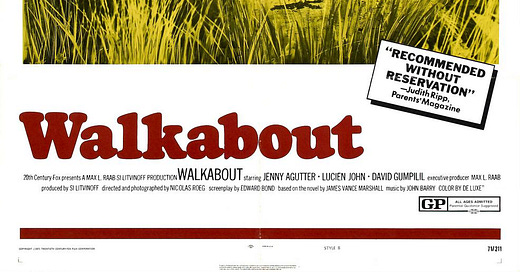I’m unsure what or why it is, but some of the most important Australian films that seem to have nothing in common, have so much in common. Realistically, I’m not that well-versed on the greatest films of pure Australian cinema, but between this, Picnic at Hanging Rock, and Mad Max, there seems to be a weird through line of experimentation.
It’s weird to think about these three being grouped together (one a faux historical drama, one a modern coming of age tale, and one a future dystopian film) but, they all do. For films that should be straight forward stories, or rather, would lend themselves to be, they seem to be very subtle in explanation and complicated in scope. Picnic tells the story of a girl who goes missing in the late 1800s (early 1900s?) on a class trip out to a park. Sounds like a mystery, right? Instead we have an examination of the impact it has on the classmates that’s edited more so as a hallucination.
Walkabout is not much different. Not only is the beginning pretty horrific - seeing as how the girl and her brother are stranded in the desert in the first place is brutal and horrifying - but the way time transitions without explanation or the goals you think they siblings have (of getting home) never seem to want to be accomplished. And sure, we can say that when you’re lost in the bush, you lose track of the concept of time and place, but so much is inferred instead of told.
Mad Max is more traditional than the other two, which is surprising for a film that is pretty fucking bonkers. Like the other two, the film conveys chaos through its non-traditional editing and conveying of plot, but I feel like that is to be expected when showing dystopian police chases and biker gangs.
These films come after experimental age of Hollywood in the 60s, and spiritually, what all three felt like were cousins to Easy Rider, the Fonda and Hopper helmed acid trip. That film definitely re-wrote traditional editing and plot telling standards while delivering a non-conventional story audiences were not used to. I could believe that films like that influenced other movie experiences around the world, especially in a day and age where information traveled a lot slower and access was way more limited, meaning people discover these things later than it’s initial release. It’s just odd that three films from the same era seem to be so alike while on paper feeling so different.
Peter Weir went on to become a much more conventional director, as would Nicholas Roeg and George Miller1. But at least with Roeg you can feel some of this same essence from Walkabout in something like Don’t Look Now, another film that lends itself to experimentation and a simple story that feels very complicated and just overall weird. So maybe it’s a directorial debut thing, or maybe that’s just what Australian cinema is - fucking weird acid trips in outback.
As unconventional as the Mad Max films are, he still is the man who made Babe.




